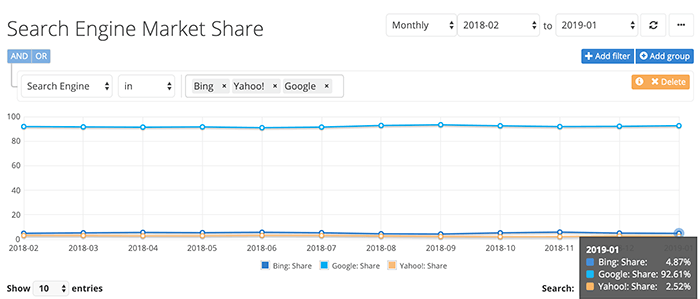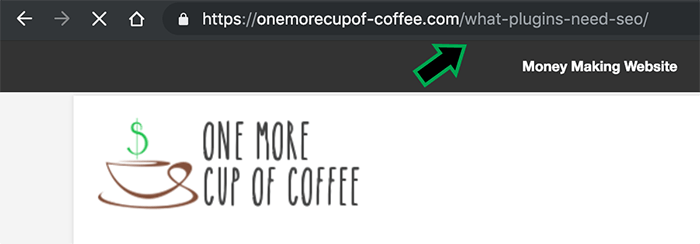 The Yahoo Bing deal was struck in 2009. Yet, they’re still considered distinct search engines. So does SEO setup work differently for Bing and Yahoo?
The Yahoo Bing deal was struck in 2009. Yet, they’re still considered distinct search engines. So does SEO setup work differently for Bing and Yahoo?When it comes to search engine optimization (SEO), most experts in the field gravitate towards optimizing websites for Google and with good reason. Currently, the search giant has more than 90 percent of the search engine market share. Statistically, more consumers use them as of the date of writing this article. Bing and Yahoo combined only have a mere 7.39 percent of the search consumer market.
>>Build An Income-Generating Website That Lasts Decades!<<
—>>Watch how I built my business step-by-step in a few minutes.
—>>Earn online income for a lifetime.
>>Start Now<<
Even so, they shouldn’t be ignored and you paying attention to how your site is positioned in these search engines can get you valuable traffic, leads, sales, and revenue. So does SEO setup work differently for Bing and Yahoo, or you can you set everything up in one go?
 Roughly three years ago a lot of us thought Bing would give Google a run for its money but big G is killing it.
Roughly three years ago a lot of us thought Bing would give Google a run for its money but big G is killing it.Yahoo still functions as a search engine but gave up its search technology to Microsoft in a deal. As a result of that agreement between Microsoft and Yahoo in December 2009, Bing search results is what users get whenever they use Yahoo.
- Answer: NO, SEO setup doesn’t work differently for Bing and Yahoo search because they’re essentially one and the same.
- Tips For Getting Your Website Ranked In Bing & Yahoo
- 1. Write Content For Humans
- 2. Get Backlinks
- 3. Keyword Towards The Front
- 4. Leverage Social Media
- Should You Focus on Bing & Yahoo?
- Tips For Getting Your Website Ranked In Bing & Yahoo
Answer: NO, SEO setup doesn’t work differently for Bing and Yahoo search because they’re essentially one and the same.
Also yes, I still recommend you devote at least some attention to getting your website indexed and ranked in Bing & Yahoo. Why? They are still relevant, and they capture a completely different market. For example, which search engine do you think your Grandparents use? Or any other boomer for that matter?
They probably use Bing. In fact, many users that purchase Microsoft products use the Bing search engine simply because they don’t know how to change the default search function. At one point Bing was also the default search engine if Safari, Apple’s browser. Firefox at one point was even using Yahoo as their default search engine (I’m not sure if they still do).
These big tech companies don’t like to share, so they’ll do anything to prevent Google from growing even bigger. Think about it – there’s a whole section of the market that you may be leaving out because you’re ignoring these to search engines.
Most people reading this will already be familiar with the Google Search Console (GSC) but Bing has its own Webmaster Tools as well.
Tips For Getting Your Website Ranked In Bing & Yahoo
Google is a beast that has over 10 years on Bing with regards to age and experience. So it’s no surprise that their algorithms are a bit more sophisticated. The search giant is able to filter and figure out certain things about web pages a lot better.
Perhaps, this is why some Webmasters claim it’s easier to rank their websites on Bing. SEO tactics between the two are similar, but if you’re familiar with common SEO tactics, just rewind about 5 years and you’ll understand what’s happening in Bing. Each has its own AI and do operate differently, but Bing is much easier to manipulate in my opinion.
One great example of this is how they treat meta keywords. Google has long abandoned these “meta keywords” because they are easy to stuff and manipulate search results. Bing on the other hand, seems to be easily swayed by jamming more keyword tags into your post.
The same can be said for overoptimization. Google has strayed away from very clear signals like keyword stuffing to promote a better user experience, however it’s usually my most-heavily optimized content that ranks well in Bing.
That being said, I wouldn’t invest too much time into trying to manipulate Bing. If you had invested in that tactic 10 years ago with Google (when it still worked), your site would be in the dumps right now! Long term, I still recommend the basics when it comes to ranking.
1. Write Content For Humans
New content creators have a tendency to seek shortcuts once they realize the amount of time and effort it takes to create engaging content.
Before you know it, they become overly focused on keyword optimization and begin pumping out spammy, non-valuable content. Then they wonder why their website visitors don’t return.
Anything you publish on your site should be well written and readable for humans. I’ve seen people use article spinners (bots that rewrite publications) to expedite content publishing in the hopes that Google or Bing will favor them.
These tactics worked in the past when AI was still in its infancy and less advanced. Today search engines use sophisticated systems to track user metrics at varied levels. This is partly made possible because Microsoft owns IE and Google developed the Chrome browser.
Write for the user first before optimizing your content for SEO. That’s how you attract customers that’ll buy your products and readers who become return visitors. SEO tricks can get you a sweet spot for a short period of time, but it’s not a long term strategy.
2. Get Backlinks
Funny enough, this strategy works with practically every search engine on the Internet. Inbound links will boost your rankings in the SERPs. The goal should be to build a natural profile of links and create systems that facilitate the attraction of new backlinks.
Google is much more sensitive to artificial link building efforts, while Bing still seems to overweight sites with a strong link profile, no matter how those links where acquired. In this case, I would not attempt too much link building to satisfy Bing because it could land you in hot water with Google.
People naturally reward websites with backlinks when they’re consistently providing value by publishing high-quality content. I link to useful information all the time from this blog! Writing great content is the whitest of white-hat link building.
3. Keyword Towards The Front
The very basics of keywords is simply to make sure it’s clear what your page is about right from the beginning.
a. URL structure is important. Keep your web addresses free of stop words. These are terms that search engine algorithms filter out by default such as “to”, “be”, “it”, etc. Your keyword should also be in your URL. While it seems obvious, many people still don’t do this. For example, a URL like domain.com/site/55636.html, means nothing to a person and neither memorable, nor will AI understand the web page until it crawls it in its entirety.
 Just looking at this URL you can see it’s about what plugins you need to do SEO. Simple!
Just looking at this URL you can see it’s about what plugins you need to do SEO. Simple!b. Use your keyword in an H1 tag (title). This is the main heading people see and it sets the tone for the article. Start things off very clear by having your keyword in the title.
c. Put your keyword in the first 100 words. This is a tough one at times, but it makes sense to strive for. Rather than start off your article with artistic mystery and not revealing what the post will be about, your keyword belongs in the first 100 words so it’s clear that the content matches the title and URL.
Not sure if you’re ranked? Here’s how to see what keywords you rank for.
4. Leverage Social Media
Search engines use social media signals as part of their ranking process. They’ve been several case studies that prove the impact of social signals on rankings, which makes sense when you think about it.
The truth is that there are more people without websites than those that have websites. One could argue that links can’t or shouldn’t be the only factor used for ranking pages because you’re not accounting for the entire web’s votes.
Aim to increase your engagement you receive on sites like Twitter, Facebook, Pinterest, or another platform that fits your website.. This may mean posting or tweeting more, and engaging with your audience to garner more links, shares, comments etc.
Should You Focus on Bing & Yahoo?
Google is the top search engine in North America and tougher to rank in because they have much higher standards. So if you focus on getting big G to trust and value your site, you’ll most likely do well in other search engines. In my opinion, Bing and Yahoo are great for back burner work, when you have extra time or money to outsource.
That being said, you may find decent success by bucking trends and going your own way. There are always undiscovered opportunities in places ignored by crowds. It may be that your audience is more Bing Search focused and you could absolutely make a full time income mastering Bing and ignoring Google. It just depends on your niche, your goals as a website owner.
What’s up ladies and dudes! Great to finally meet you, and I hope you enjoyed this post. I started my first online business in 2010 promoting computer software and now I help newbies start their own businesses. Sign up for my #1 recommended training course and learn how to start your business for FREE!

